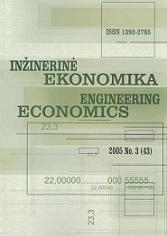Public Participation in City Governance Decision-Making: Theoretical Approach
Public Participation in City Governance Decision-Making: Theoretical Approach
Author(s): Rigita Tijūnaitienė, Bronius NeverauskasSubject(s): Economy
Published by: Kauno Technologijos Universitetas
Keywords: urban governance; public participation; democracy; theories of democracy.
Summary/Abstract: The paper deals with the analysis of the theoretical aspect of public participation in decision-making processes relying on one of the theories of this phenomenon, namely democratic theory. The issue of public participation itself is not a new phenomenon; interest in it has been either increasing or decreasing from time to time. An imperative of developing the ways of “public involvement“ in decision-making processes on issues related to life has not lost its importance and is still relevant nowadays. Public participation is a multi-dimensional phenomenon therefore in order to understand its essence it is necessary to analyse it as a multi-sided phenomenon form different perspectives. Different paradigms: psychological, sociological, economic, political and legal shape the forms of questions on participation and answers to them; moreover, participation is related to such issues as individual motivation and socio-political structures and processes in communities among them. Therefore the number of conceptions has been increasing and different theoretical approaches have been noticed. In order to understand practical problems firstly a deep theoretical analysis is necessary to show what motivates people participate solving community problems or, on the contrary, prevents them from doing it. As it has been noted, literature sources on public participation are related to theoretical works in other fields; the authors of this work have confined themselves to the analysis of one field, which approximates to the theories of democracy as the basis for further analysis of public participation in order to identify the basic principles of public participation. This study dissociates from comprehensive analysis of public participation concepts and analysis of other theories such as social capital, rational choice and communication planning, which explain the abovementioned phenomenon. Although the importance and expedience of these theories is unquestionable for comprehensive and complex analysis of the concept of public participation, the first step doing it and basing further analysis is summing the context of democracy. Thus the main object of the paper is public participation at the local governance level where democracy is put into practice best. Especially taking into consideration that local people know their problems best, thus the exercise of democratic rights and freedoms is most optimal participating at the local level. This analysis makes reference to the works of suchauthors as Dachler , Wilpert (1978), Holford , Edirisingha (2000), Sisk (2001), Larry (2002), Held (2002), Blaug (2002), Farrelly (2004), Landman (2005), Gaventa (1999, 2006), etc. and Gallie (1956), Lipset (1959), Dahl (1961, 1965), Schumpeter (1966), Pateman 1970, Hunter (1953), etc. cited in the above-mentioned authors.
Journal: Engineering Economics
- Issue Year: 2007
- Issue No: 4 (54)
- Page Range: 27-35
- Page Count: 9
- Language: English

